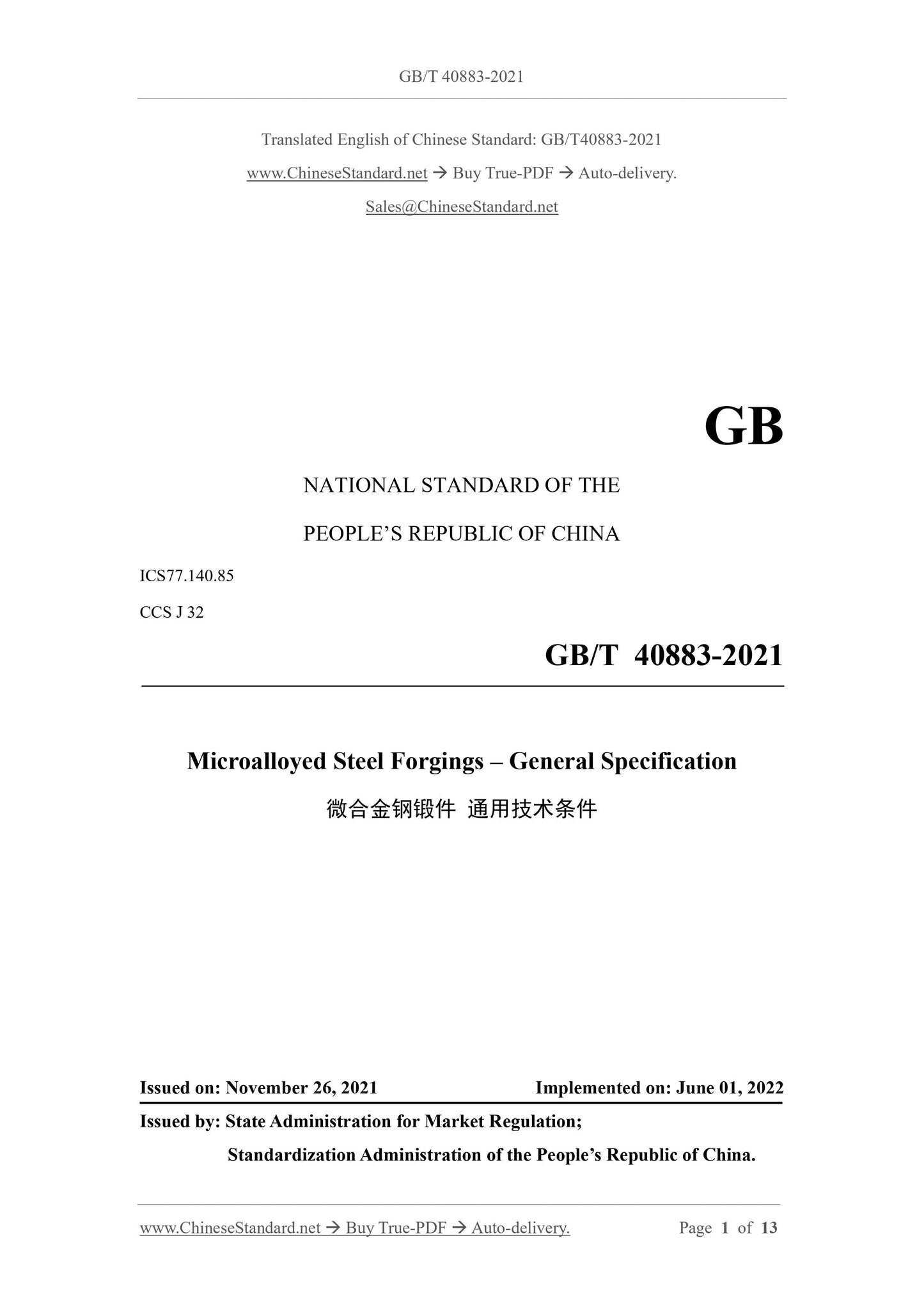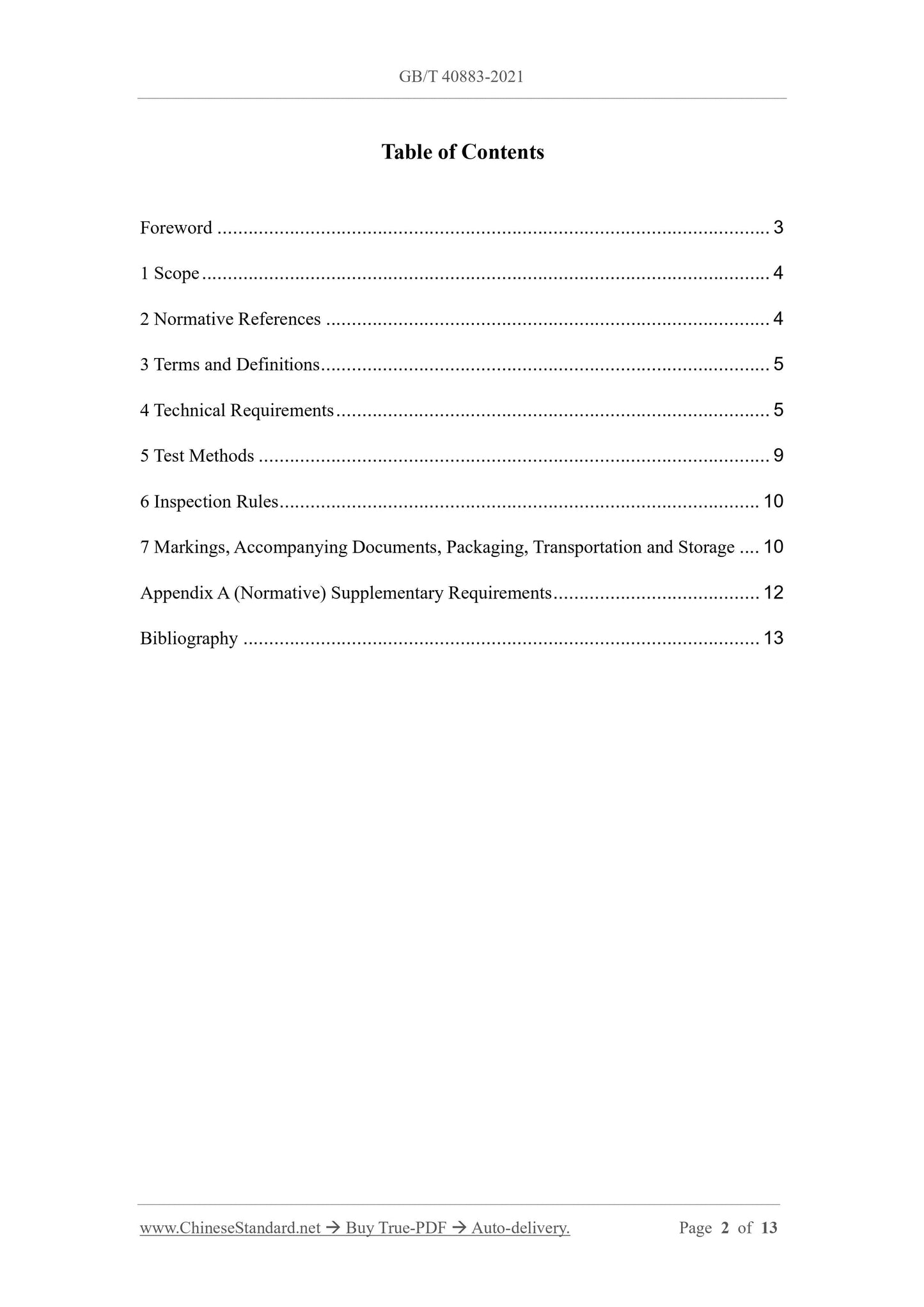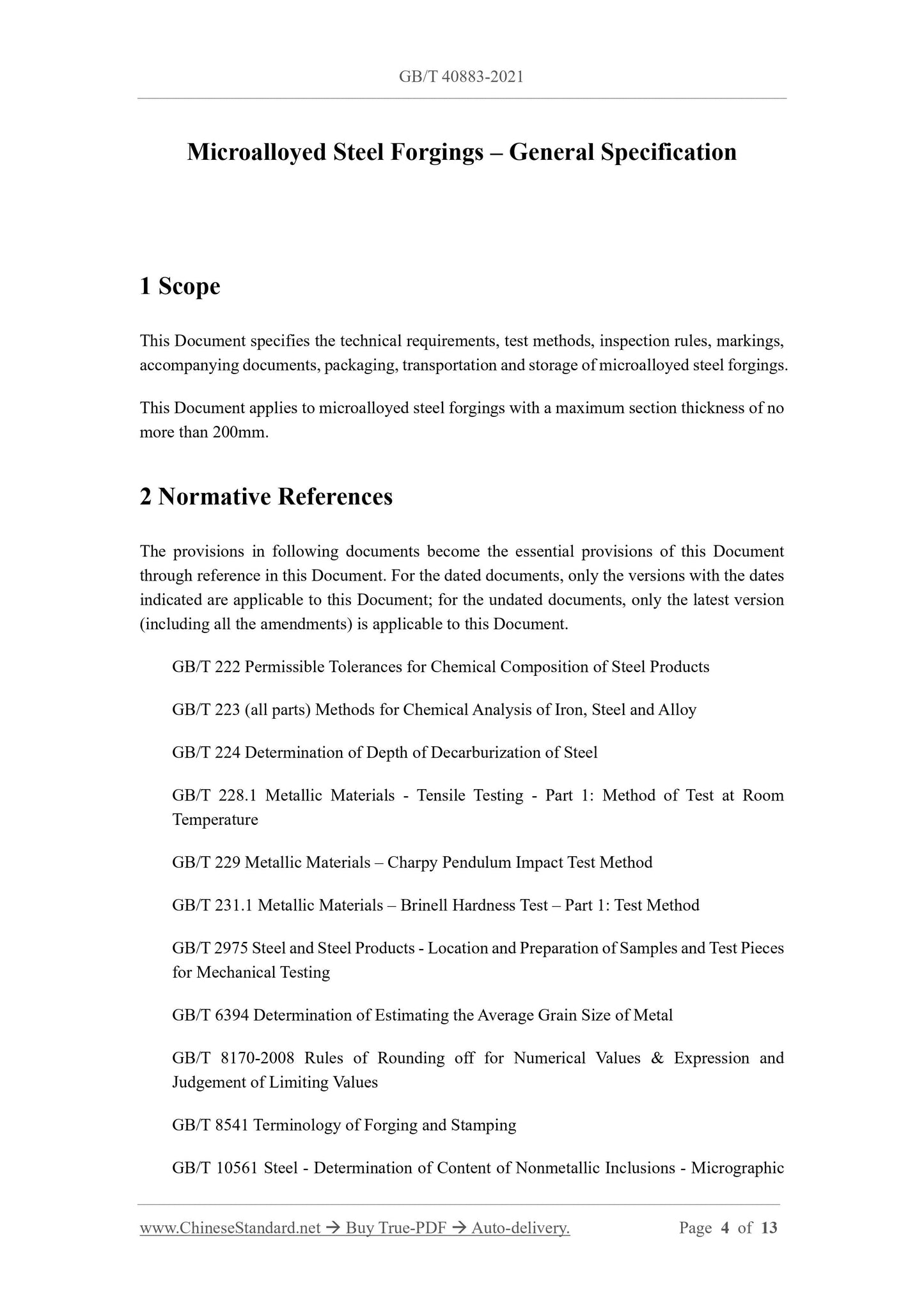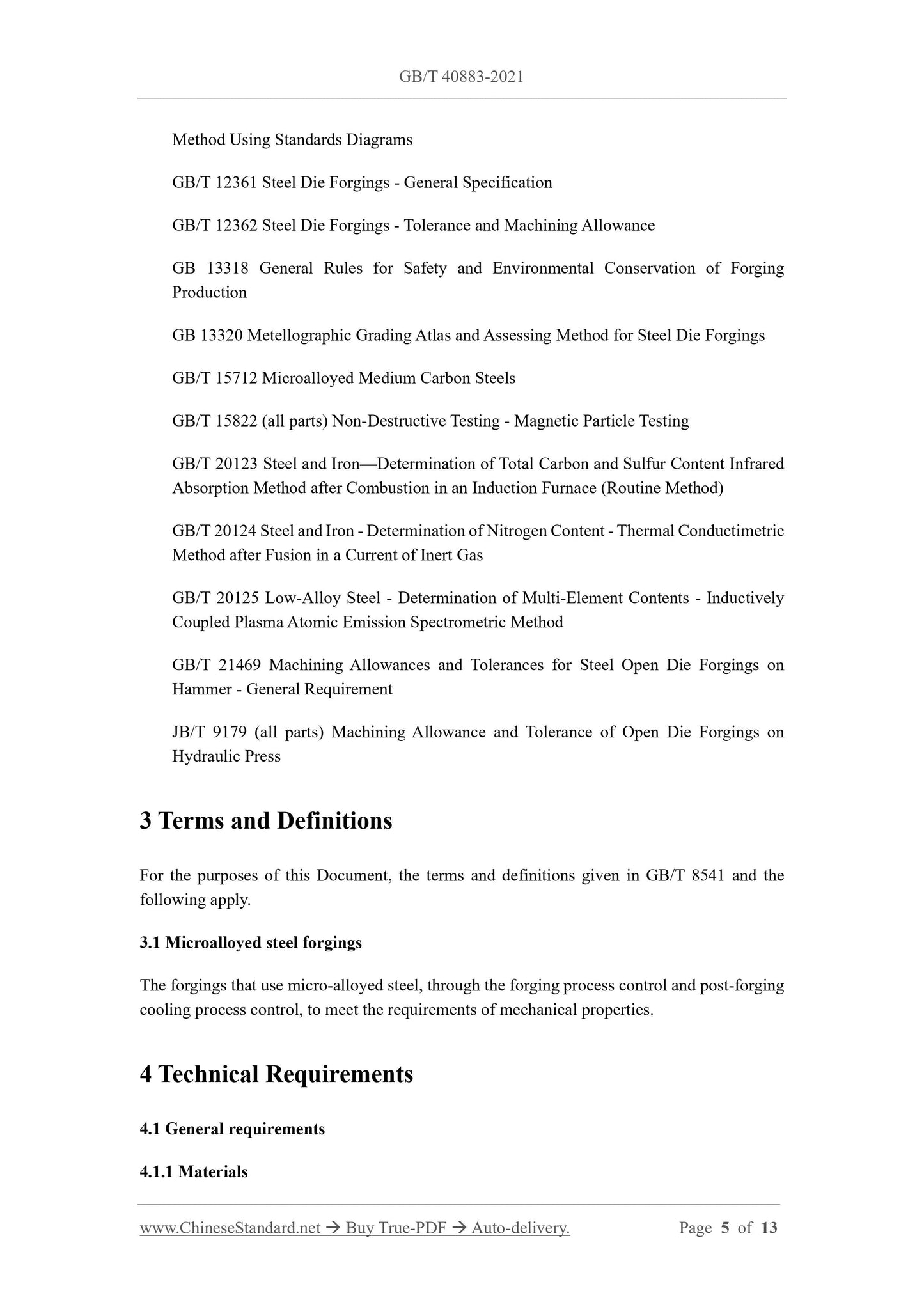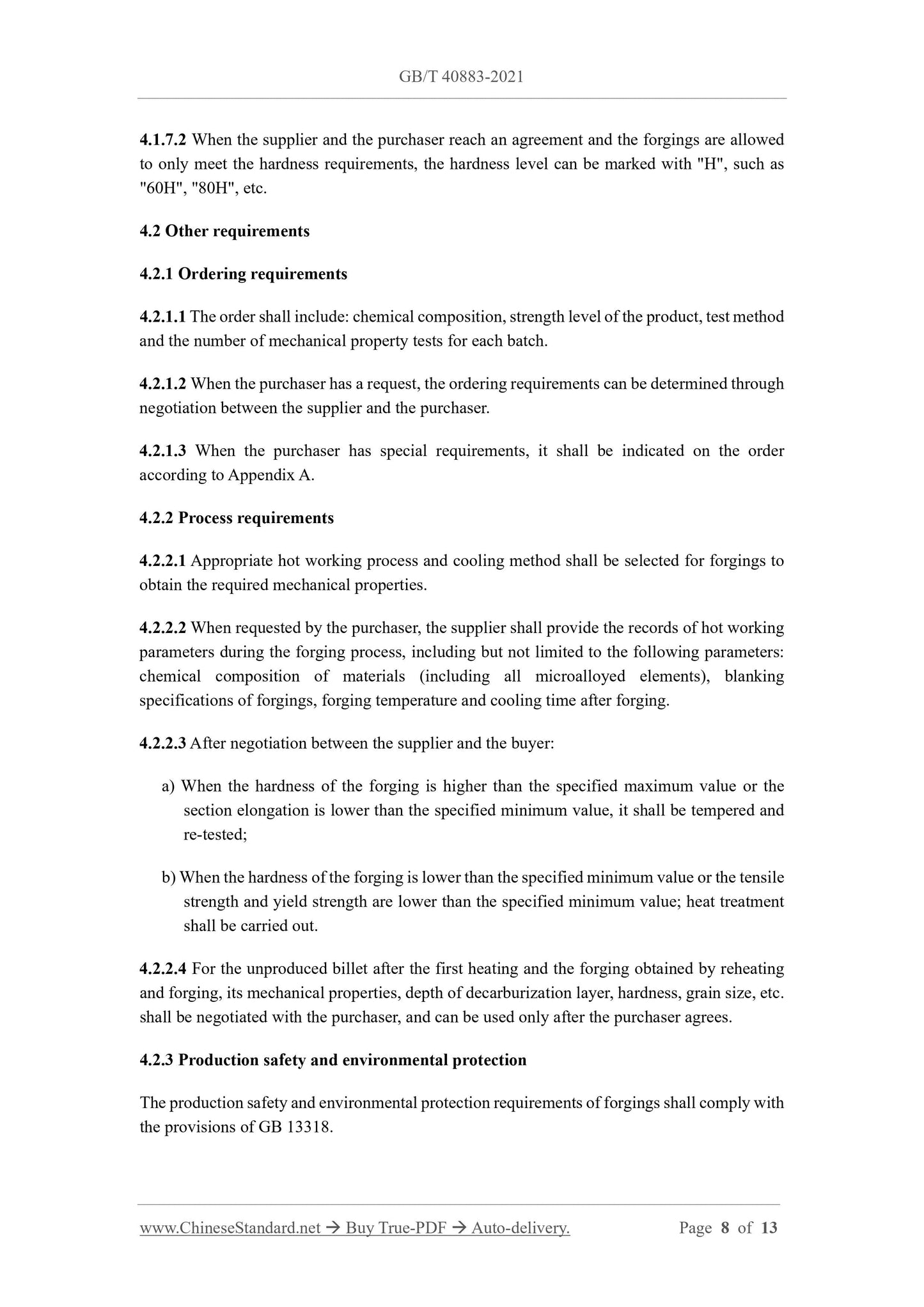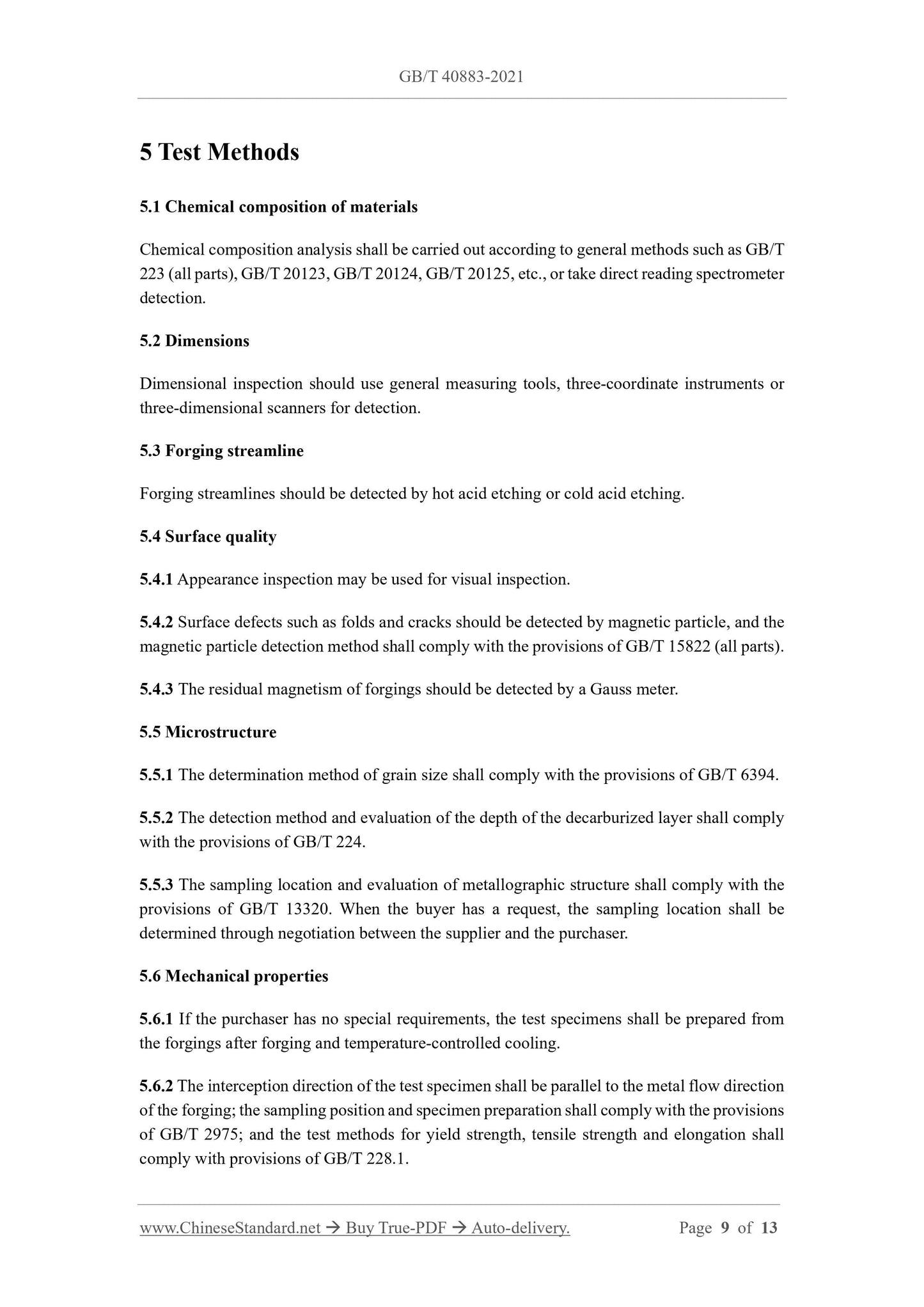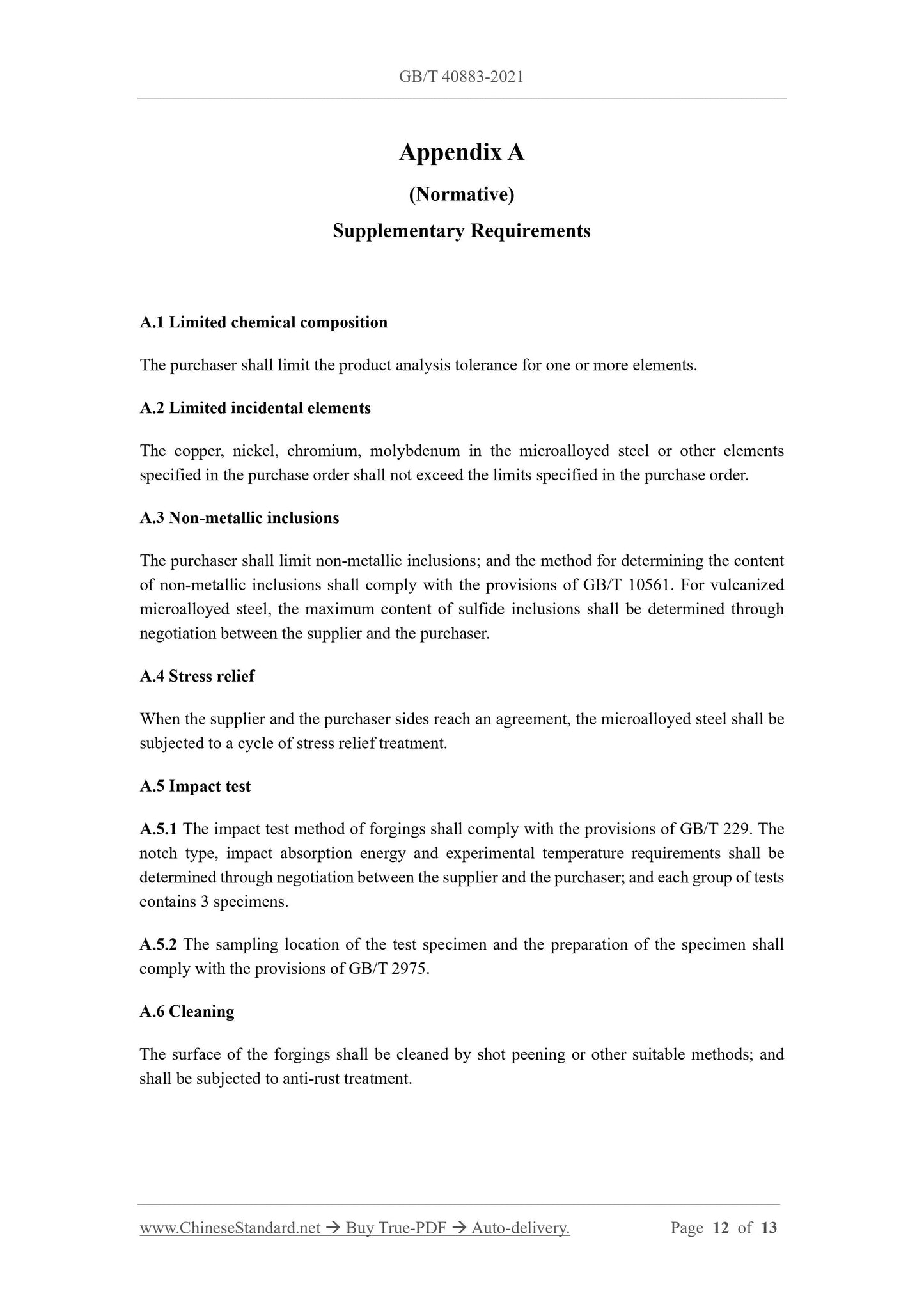1
/
of
7
PayPal, credit cards. Download editable-PDF & invoice in 1 second!
GB/T 40883-2021 English PDF (GBT40883-2021)
GB/T 40883-2021 English PDF (GBT40883-2021)
Regular price
$170.00 USD
Regular price
Sale price
$170.00 USD
Unit price
/
per
Shipping calculated at checkout.
Couldn't load pickup availability
Delivery: 3 seconds. Download true-PDF + Invoice.
Get QUOTATION in 1-minute: Click GB/T 40883-2021
Historical versions: GB/T 40883-2021
Preview True-PDF (Reload/Scroll if blank)
GB/T 40883-2021: Microalloyed steel forgings -- General specification
GB/T 40883-2021
NATIONAL STANDARD OF THE
PEOPLE’S REPUBLIC OF CHINA
ICS77.140.85
CCS J 32
Microalloyed Steel Forgings – General Specification
ISSUED ON. NOVEMBER 26, 2021
IMPLEMENTED ON. JUNE 01, 2022
Issued by. State Administration for Market Regulation;
Standardization Administration of the People’s Republic of China.
Table of Contents
Foreword... 3
1 Scope... 4
2 Normative References... 4
3 Terms and Definitions... 5
4 Technical Requirements... 5
5 Test Methods... 9
6 Inspection Rules... 10
7 Markings, Accompanying Documents, Packaging, Transportation and Storage... 10
Appendix A (Normative) Supplementary Requirements... 12
Bibliography... 13
Microalloyed Steel Forgings – General Specification
1 Scope
This Document specifies the technical requirements, test methods, inspection rules, markings,
accompanying documents, packaging, transportation and storage of microalloyed steel forgings.
This Document applies to microalloyed steel forgings with a maximum section thickness of no
more than 200mm.
2 Normative References
The provisions in following documents become the essential provisions of this Document
through reference in this Document. For the dated documents, only the versions with the dates
indicated are applicable to this Document; for the undated documents, only the latest version
(including all the amendments) is applicable to this Document.
GB/T 222 Permissible Tolerances for Chemical Composition of Steel Products
GB/T 223 (all parts) Methods for Chemical Analysis of Iron, Steel and Alloy
GB/T 224 Determination of Depth of Decarburization of Steel
GB/T 228.1 Metallic Materials - Tensile Testing - Part 1.Method of Test at Room
Temperature
GB/T 229 Metallic Materials – Charpy Pendulum Impact Test Method
GB/T 231.1 Metallic Materials – Brinell Hardness Test – Part 1.Test Method
GB/T 2975 Steel and Steel Products - Location and Preparation of Samples and Test Pieces
for Mechanical Testing
GB/T 6394 Determination of Estimating the Average Grain Size of Metal
GB/T 8170-2008 Rules of Rounding off for Numerical Values and Expression and
Judgement of Limiting Values
GB/T 8541 Terminology of Forging and Stamping
GB/T 10561 Steel - Determination of Content of Nonmetallic Inclusions - Micrographic
Method Using Standards Diagrams
GB/T 12361 Steel Die Forgings - General Specification
GB/T 12362 Steel Die Forgings - Tolerance and Machining Allowance
GB 13318 General Rules for Safety and Environmental Conservation of Forging
Production
GB 13320 Metellographic Grading Atlas and Assessing Method for Steel Die Forgings
GB/T 15712 Microalloyed Medium Carbon Steels
GB/T 15822 (all parts) Non-Destructive Testing - Magnetic Particle Testing
GB/T 20123 Steel and Iron—Determination of Total Carbon and Sulfur Content Infrared
Absorption Method after Combustion in an Induction Furnace (Routine Method)
GB/T 20124 Steel and Iron - Determination of Nitrogen Content - Thermal Conductimetric
Method after Fusion in a Current of Inert Gas
GB/T 20125 Low-Alloy Steel - Determination of Multi-Element Contents - Inductively
Coupled Plasma Atomic Emission Spectrometric Method
GB/T 21469 Machining Allowances and Tolerances for Steel Open Die Forgings on
Hammer - General Requirement
JB/T 9179 (all parts) Machining Allowance and Tolerance of Open Die Forgings on
Hydraulic Press
3 Terms and Definitions
For the purposes of this Document, the terms and definitions given in GB/T 8541 and the
following apply.
3.1 Microalloyed steel forgings
The forgings that use micro-alloyed steel, through the forging process control and post-forging
cooling process control, to meet the requirements of mechanical properties.
4 Technical Requirements
4.1 General requirements
4.1.1 Materials
4.1.7.2 When the supplier and the purchaser reach an agreement and the forgings are allowed
to only meet the hardness requirements, the hardness level can be marked with "H", such as
"60H", "80H", etc.
4.2 Other requirements
4.2.1 Ordering requirements
4.2.1.1 The order shall include. chemical composition, strength level of the product, test method
and the number of mechanical property tests for each batch.
4.2.1.2 When the purchaser has a request, the ordering requirements can be determined through
negotiation between the supplier and the purchaser.
4.2.1.3 When the purchaser has special requirements, it shall be indicated on the order
according to Appendix A.
4.2.2 Process requirements
4.2.2.1 Appropriate hot working process and cooling method shall be selected for forgings to
obtain the required mechanical properties.
4.2.2.2 When requested by the purchaser, the supplier shall provide the records of hot working
parameters during the forging process, including but not limited to the following parameters.
chemical composition of materials (including all microalloyed elements), blanking
specifications of forgings, forging temperature and cooling time after forging.
4.2.2.3 After negotiation between the supplier and the buyer.
a) When the hardness of the forging is higher than the specified maximum value or the
section elongation is lower than the specified minimum value, it shall be tempered and
re-tested;
b) When the hardness of the forging is lower than the specified minimum value or the tensile
strength and yield strength are lower than the specified minimum value; heat treatment
shall be carried out.
4.2.2.4 For the unproduced billet after the first heating and the forging obtained by reheating
and forging, its mechanical properties, depth of decarburization layer, hardness, grain size, etc.
shall be negotiated with the purchaser, and can be used only after the purchaser agrees.
4.2.3 Production safety and environmental protection
The production safety and environmental protection requirements of forgings shall comply with
the provisions of GB 13318.
5 Test Methods
5.1 Chemical composition of materials
Chemical composition analysis shall be carried out according to general methods such as GB/T
223 (all parts), GB/T 20123, GB/T 20124, GB/T 20125, etc., or take direct reading spectrometer
detection.
5.2 Dimensions
Dimensional inspection should use general measuring tools, three-coordinate instruments or
three-dimensional scanners for detection.
5.3 Forging streamline
Forging streamlines should be detected by hot acid etching or cold acid etching.
5.4 Surface quality
5.4.1 Appearance inspection may be used for visual inspection.
5.4.2 Surface defects such as folds and cracks should be detected by magnetic particle, and the
magnetic particle detection method shall comply with the provisions of GB/T 15822 (all parts).
5.4.3 The residual magnetism of forgings should be detected by a Gauss meter.
5.5 Microstructure
5.5.1 The determination method of grain size shall comply with the provisions of GB/T 6394.
5.5.2 The detection method and evaluation of the depth of the decarburized layer shall comply
with the provisions of GB/T 224.
5.5.3 The sampling location and evaluation of metallographic structure shall comply with the
provisions of GB/T 13320.When the buyer has a request, the sampling location shall be
determined through negotiation between the supplier and the purchaser.
5.6 Mechanical properties
5.6.1 If the purchaser has no special requirements, the test specimens shall be prepared from
the forgings after forging and temperature-controlled cooling.
5.6.2 The interception direction o...
Get QUOTATION in 1-minute: Click GB/T 40883-2021
Historical versions: GB/T 40883-2021
Preview True-PDF (Reload/Scroll if blank)
GB/T 40883-2021: Microalloyed steel forgings -- General specification
GB/T 40883-2021
NATIONAL STANDARD OF THE
PEOPLE’S REPUBLIC OF CHINA
ICS77.140.85
CCS J 32
Microalloyed Steel Forgings – General Specification
ISSUED ON. NOVEMBER 26, 2021
IMPLEMENTED ON. JUNE 01, 2022
Issued by. State Administration for Market Regulation;
Standardization Administration of the People’s Republic of China.
Table of Contents
Foreword... 3
1 Scope... 4
2 Normative References... 4
3 Terms and Definitions... 5
4 Technical Requirements... 5
5 Test Methods... 9
6 Inspection Rules... 10
7 Markings, Accompanying Documents, Packaging, Transportation and Storage... 10
Appendix A (Normative) Supplementary Requirements... 12
Bibliography... 13
Microalloyed Steel Forgings – General Specification
1 Scope
This Document specifies the technical requirements, test methods, inspection rules, markings,
accompanying documents, packaging, transportation and storage of microalloyed steel forgings.
This Document applies to microalloyed steel forgings with a maximum section thickness of no
more than 200mm.
2 Normative References
The provisions in following documents become the essential provisions of this Document
through reference in this Document. For the dated documents, only the versions with the dates
indicated are applicable to this Document; for the undated documents, only the latest version
(including all the amendments) is applicable to this Document.
GB/T 222 Permissible Tolerances for Chemical Composition of Steel Products
GB/T 223 (all parts) Methods for Chemical Analysis of Iron, Steel and Alloy
GB/T 224 Determination of Depth of Decarburization of Steel
GB/T 228.1 Metallic Materials - Tensile Testing - Part 1.Method of Test at Room
Temperature
GB/T 229 Metallic Materials – Charpy Pendulum Impact Test Method
GB/T 231.1 Metallic Materials – Brinell Hardness Test – Part 1.Test Method
GB/T 2975 Steel and Steel Products - Location and Preparation of Samples and Test Pieces
for Mechanical Testing
GB/T 6394 Determination of Estimating the Average Grain Size of Metal
GB/T 8170-2008 Rules of Rounding off for Numerical Values and Expression and
Judgement of Limiting Values
GB/T 8541 Terminology of Forging and Stamping
GB/T 10561 Steel - Determination of Content of Nonmetallic Inclusions - Micrographic
Method Using Standards Diagrams
GB/T 12361 Steel Die Forgings - General Specification
GB/T 12362 Steel Die Forgings - Tolerance and Machining Allowance
GB 13318 General Rules for Safety and Environmental Conservation of Forging
Production
GB 13320 Metellographic Grading Atlas and Assessing Method for Steel Die Forgings
GB/T 15712 Microalloyed Medium Carbon Steels
GB/T 15822 (all parts) Non-Destructive Testing - Magnetic Particle Testing
GB/T 20123 Steel and Iron—Determination of Total Carbon and Sulfur Content Infrared
Absorption Method after Combustion in an Induction Furnace (Routine Method)
GB/T 20124 Steel and Iron - Determination of Nitrogen Content - Thermal Conductimetric
Method after Fusion in a Current of Inert Gas
GB/T 20125 Low-Alloy Steel - Determination of Multi-Element Contents - Inductively
Coupled Plasma Atomic Emission Spectrometric Method
GB/T 21469 Machining Allowances and Tolerances for Steel Open Die Forgings on
Hammer - General Requirement
JB/T 9179 (all parts) Machining Allowance and Tolerance of Open Die Forgings on
Hydraulic Press
3 Terms and Definitions
For the purposes of this Document, the terms and definitions given in GB/T 8541 and the
following apply.
3.1 Microalloyed steel forgings
The forgings that use micro-alloyed steel, through the forging process control and post-forging
cooling process control, to meet the requirements of mechanical properties.
4 Technical Requirements
4.1 General requirements
4.1.1 Materials
4.1.7.2 When the supplier and the purchaser reach an agreement and the forgings are allowed
to only meet the hardness requirements, the hardness level can be marked with "H", such as
"60H", "80H", etc.
4.2 Other requirements
4.2.1 Ordering requirements
4.2.1.1 The order shall include. chemical composition, strength level of the product, test method
and the number of mechanical property tests for each batch.
4.2.1.2 When the purchaser has a request, the ordering requirements can be determined through
negotiation between the supplier and the purchaser.
4.2.1.3 When the purchaser has special requirements, it shall be indicated on the order
according to Appendix A.
4.2.2 Process requirements
4.2.2.1 Appropriate hot working process and cooling method shall be selected for forgings to
obtain the required mechanical properties.
4.2.2.2 When requested by the purchaser, the supplier shall provide the records of hot working
parameters during the forging process, including but not limited to the following parameters.
chemical composition of materials (including all microalloyed elements), blanking
specifications of forgings, forging temperature and cooling time after forging.
4.2.2.3 After negotiation between the supplier and the buyer.
a) When the hardness of the forging is higher than the specified maximum value or the
section elongation is lower than the specified minimum value, it shall be tempered and
re-tested;
b) When the hardness of the forging is lower than the specified minimum value or the tensile
strength and yield strength are lower than the specified minimum value; heat treatment
shall be carried out.
4.2.2.4 For the unproduced billet after the first heating and the forging obtained by reheating
and forging, its mechanical properties, depth of decarburization layer, hardness, grain size, etc.
shall be negotiated with the purchaser, and can be used only after the purchaser agrees.
4.2.3 Production safety and environmental protection
The production safety and environmental protection requirements of forgings shall comply with
the provisions of GB 13318.
5 Test Methods
5.1 Chemical composition of materials
Chemical composition analysis shall be carried out according to general methods such as GB/T
223 (all parts), GB/T 20123, GB/T 20124, GB/T 20125, etc., or take direct reading spectrometer
detection.
5.2 Dimensions
Dimensional inspection should use general measuring tools, three-coordinate instruments or
three-dimensional scanners for detection.
5.3 Forging streamline
Forging streamlines should be detected by hot acid etching or cold acid etching.
5.4 Surface quality
5.4.1 Appearance inspection may be used for visual inspection.
5.4.2 Surface defects such as folds and cracks should be detected by magnetic particle, and the
magnetic particle detection method shall comply with the provisions of GB/T 15822 (all parts).
5.4.3 The residual magnetism of forgings should be detected by a Gauss meter.
5.5 Microstructure
5.5.1 The determination method of grain size shall comply with the provisions of GB/T 6394.
5.5.2 The detection method and evaluation of the depth of the decarburized layer shall comply
with the provisions of GB/T 224.
5.5.3 The sampling location and evaluation of metallographic structure shall comply with the
provisions of GB/T 13320.When the buyer has a request, the sampling location shall be
determined through negotiation between the supplier and the purchaser.
5.6 Mechanical properties
5.6.1 If the purchaser has no special requirements, the test specimens shall be prepared from
the forgings after forging and temperature-controlled cooling.
5.6.2 The interception direction o...
Share
